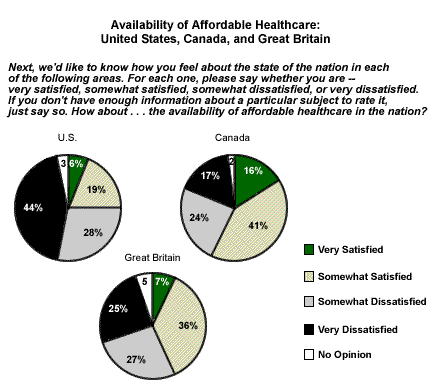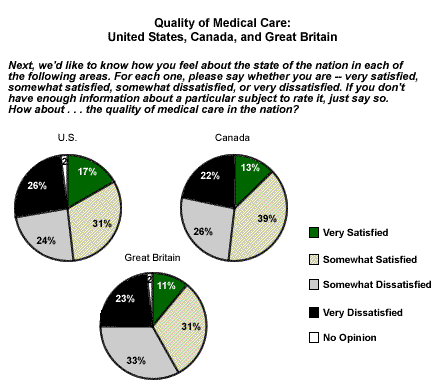peplaw06
2
- Messages
- 8,660
- Reaction score
- 0
Well, no shit.The penalty is assessed by the IRS.
Well, no shit.The penalty is assessed by the IRS.
No, they haven't.
http://www.people-press.org/2012/06/15/obama-health-care-law-where-does-the-public-stand/
< 50% is not a majority
And you are right that since LBJ's Great Society the GOP has shifted back to what they were in the days of Herbert Hoover and Robert Taft. Look at Congressional votes from the early 1930s and you will note a similar trend. Do you think that FDR and Teddy Roosevelt were right or that two of the reputed worst presidents in our nations history were?
Personally, I think this country needs a man like Theodore Roosevelt in the worst way.
Oh really the majority?
http://www.realclearpolitics.com/epolls/other/obama_and_democrats_health_care_plan-1130.html
I see you continue to make things up as you go along.
How does the quality decrease? Reimbursement rates will be tied to quality so it's a little odd that providers would deliberately forfeit money by providing crappier service.
The "quality" metric is probably tied to the same things that many carriers are rated on now, and they are almost all exclusively things associated with preventive care (getting an annual mammogram, pap test, well baby screenings etc etc)
When I talk about quality, I'm talking about outcomes and service/treatment options for complex medical issues. Access to care WILL be restricted. In virtually every country in the world where there is some form of socialized medicine access to specialty care is greatly restricted, which limits options and ultimately sacrifices care quality.

I never said you said it was. Are a lot of people without insurance simply unemployed? It's called a logical extension of what you state. it's not my fault youre myopic.
Curious though, in what way will access be restricted? Saying it will be restricted says nothing about why it will be restricted. Care to elaborate?
Interesting then that all the noted "socialist" medicine countries like Canada and almost all of the EU would get better overall performance scores from the WHO.
View attachment 408
If the care in those countries is so great, why do their wealthy people, royalty, government officials etc etc come here for their care when they get really sick or need really involved procedures?
And lastly, the WHO is controlled by the United Nations. I'm sure there's absolutely no bias in their "reports" at all.
I thought I might be able to go the rest of my life without being able to hear that word. Thanks for bringing that over from the zone. I hope you continue to use it like a four year old.
You haven't even read the opinion, so you don't know what's clear and what's not.
Penalties have to be implemented through the tax code... It doesn't mean every penalty is a tax. Again, the semantics are what's important. Anyone with even a modicum of knowledge about appellate procedure and appellate theories would know that. You don't. But I guess you're entitled to your uneducated opinion.
Towne v. Eisner, 245 U.S. 418, 425 (1918) (“A word is not a crystal, transparent and unchanged, it is the
skin of a living thought and may vary greatly in color and content according to the circumstances and the time in
which it is used.” (citation omitted)); Powell v. United States Cartridge Co., 339 U.S. 497, 529 (1950) (Frankfurter,
J., dissenting) (“In law as elsewhere words of many-hued meaning derive their scope from the use to which they are
put.”).
The distinction between law and fact for purposes of identifying the standard of review is
often a difficult line to draw.179 In part, this is because the line “varies according to the nature of
the substantive law at issue.”180 More fundamentally, many believe that the distinction blurs because “[c]haracterization of an issue . . . as fact or law for purposes of identifying a formalized
standard of review depends on the perceived need for review, not on the actual status of the
issue.”181 “The `magic’ of de novo appellate determination . . . serves not to reflect a nuanced
definition of law and fact, but to affect trial/appellate authority and . . . [when a jury is involved]
the role of the jury.”182 Judge Friendly observed that “what a court can determine better than a
jury, [is] perhaps about the only satisfactory criterion for distinguishing ‘law’ from ‘fact.’”183
Such a policy-oriented definition may sound empty, but may offer a more functional meaning
than attempts to resolve difficult institutional questions by simple resort to the definitional trump
cards law and fact. Semantics may at times be less useful than a case-based inquiry into the
appropriateness of leaving a particular question to the trial court rather than resolving it anew or
on a more generalized level. The cases support that belief. The Supreme Court has unequivocally
stated:
[T]he fact/law distinction at times has turned on a determination that, as a matter of the sound
administration of justice, one judicial actor is better positioned than another to decide the issue in
question. Where, for example ... the relevant legal principle can be given meaning only through its
application to the particular circumstances of a case, the Court has been reluctant to give the trier
of fact’s conclusions presumptive force .... In contrast, other considerations often suggest the
appropriateness of resolving close questions concerning the status of an issue as one of “law” or
“fact” in favor of extending deference to the trial court.184
Most law-fact dilemmas boil down to an analysis of how the court treats so-called mixed
questions. In a mixed question of law and fact, the trial court has applied existing law to fact
through a process of three steps: (1) establish a fact, (2) select the applicable rule of law, and (3)
apply the law to the fact to determine whether the rule has been violated.186 Nationally, courts
are split over the proper standard of review for mixed questions of law and fact.187
You cited one poll, there are literally 100's and many have shown massive majorities against the healthcare law.
The "quality" metric is probably tied to the same things that many carriers are rated on now, and they are almost all exclusively things associated with preventive care (getting an annual mammogram, pap test, well baby screenings etc etc)
When I talk about quality, I'm talking about outcomes and service/treatment options for complex medical issues. Access to care WILL be restricted. In virtually every country in the world where there is some form of socialized medicine access to specialty care is greatly restricted, which limits options and ultimately sacrifices care quality.



Bottom Line
In all three countries, there is great variation of opinion within the population on both the quality of medical care and the availability of affordable healthcare. It is a testament to national health systems that people in Canada and Great Britain are significantly more satisfied with availability of affordable healthcare than their American counterparts are.
In Great Britain, satisfaction with access to affordable healthcare (43%) is consistent with satisfaction with quality (42%). In Canada, satisfaction with access to affordable healthcare (57%) is slightly higher than satisfaction with quality (52%). But the most dramatic variation in satisfaction with these two facets of the healthcare system occurs in the United States, where only 25% are satisfied with the availability of affordable healthcare, but 48% are satisfied with quality. Once again, this dichotomy seems to support the hypothesis that private healthcare encourages high-quality standards, but may be a barrier to access and affordability.
On a less relative basis, the fact that 72% of Americans say they are dissatisfied with the availability of affordable healthcare, and 50% are dissatisfied with the quality of medical care are cause for concern. Regardless of how these numbers measure up to those in Canada and Great Britain, they indicate that the U.S. healthcare system has considerable room for improvement.
They think they are going to receive something they can't receive elsewhere..........isn't that obvious?
Why did Steve Jobs go to Tennessee for some treatment? You think Tennessee puts out better doctors or has more experienced doctors than all of California?
They have the ability to, and have the belieft that they will get better treatment.
What about when they don't come to the US and are treated at home?
This is a ridiculous argument. Being able to provide specialty services is completely unrelated to the topic. So long as one hospital or university can come up with something new and better, the ability to provide these types of services won't change and will remain unrelated to how healthcare systems perform, on the whole.
Are you really suggesting that the US has the best healthcare in the world because they are out in front in one aspect, despite that they may be lagging in others?
That's like saying Dallas is the best team in the NFL and your support for such a statement is that they have the best stadium.
You're right. I hadn't considered that the UNs primary objective was to denigrate the reputation of the US healthcare system.
I'll remember to wear my tin foil hat the next time.
This sounds like it is straight from the AMA press release. 'Sacrifices' that 'every country in the world where there is some form of socialized medicine' have us beaten in every standardized health metric that there is. Then of course there is satisfaction of their ccare. Would you care to look at satisfaction rates:


http://www.gallup.com/poll/8056/healthcare-system-ratings-us-great-britain-canada.aspx
gmfb
Please. The UN's job is to denigrate the US anyway it can. They want a socialist USA, its always been their goal. Anyhing they can do to pushthem down the road further is what they choose to do, and a socialized healthcare model is part of it.
 Yeah that's it. We only fund it and have a permanent seat on the security council. I have an idea: perhaps everything we do is not perfection lined with gold?
Yeah that's it. We only fund it and have a permanent seat on the security council. I have an idea: perhaps everything we do is not perfection lined with gold?Yeah that's it. We only fund it and have a permanent seat on the security council. I have an idea: perhaps everything we do is not perfection lined with gold?
More red scare please.
